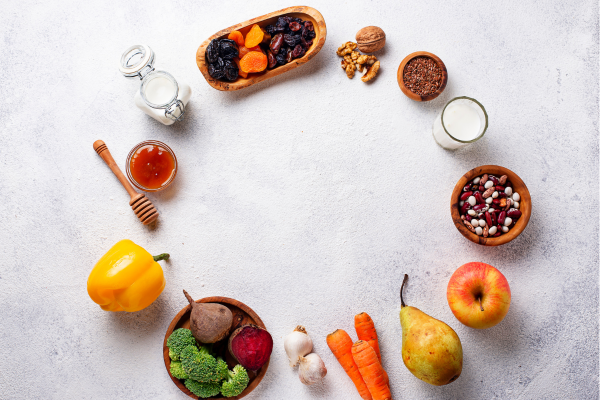Leveraging Prebiotic and Probiotic Synergy for Value-Added Products
Formulating Gut-Supporting Products with Synbiotic Solutions

The positive effects of a healthy microbiome are well-researched. Prebiotics and probiotics have become pivotal in the health and wellness space. Researchers have identified a synbiotic relationship between prebiotics and probiotics, promising potential digestive health and immune-promoting advantages. But, supporting gut health is more challenging than it may seem. Prebiotics such as inulin or oligofructose derived from chicory fiber are classified as dietary fiber. It is these fibers that feed the naturally present beneficial bacteria (probiotics) in the digestive system.
While many consumers fret about sugar intake and high-caloric diets, it’s a little-known fact that just 5 percent of individuals in the United States actually achieve the daily dietary goals set by the Institute of Medicine, which recommends 25 grams of fiber for women and 38 grams for men. This reveals a widespread shortfall in the population's fiber intake, commonly referred to by nutritionists as the "fiber gap."
Both inulin and oligofructose from chicory are easy to use, easy to formulate with, and can have a mild, sweet taste. They help many food product developers overcome various challenges associated with formulating with plant-based dietary fiber. From the consumers' perspective, these ingredients make nutritional, healthy, and great-tasting food products.
There is a growing demand for food and beverage products supporting digestive health. Nearly one in three (32%) of consumers said they sought out digestive health benefits from food and beverage, according to the 2023 IFIC Food Health Report.
The popularity of prebiotics and probiotics has grown as more research linked these ingredients with health benefits. However, some consumers don’t know the best sources for probiotics and prebiotics, according to the 2022 IFIC survey. For example, 54% of probiotic consumers and 38% of prebiotic consumers choose yogurt and kefir as their primary source. While these products are good sources of probiotics, they do not necessarily offer prebiotic benefits.
Fruits and vegetables were listed as the second most popular sources of fiber among food products, but their fiber extracts are not easily added to dairy or non-dairy cultured products.
Inulin and oligofructose (chicory fiber extracts) are multifunctional ingredients. Not only are they a source of prebiotic fiber, but they are also low calorie and can help in sugar reduction in both fruit preparations or in the white mass of cultured products. Inulin can also have fat-mimetic properties and add the necessary mouthfeel to fat-reduced products while simultaneously reducing calories.
Optimizing Gut Health Through Synbiotic Interaction
Prebiotics are the food for probiotics.
By consuming prebiotic dietary fiber such as chicory inulin or oligofructose, one is feeding one’s very own beneficial microflora present in the digestive system or supplemented by consuming probiotic-rich cultured dairy or non-dairy products. The beneficial bacteria include bifidobacteria, which have a host of health and nutrition benefits, including the support of immune function. Dietary fiber is well known to improve digestive health and relieve constipation.
As research evolves, various prebiotic-probiotic combinations are explored to advance overall wellness, gut health, and immune function.
What Are Probiotics?
Probiotics are live microorganisms, such as bacteria, that provide health benefits when consumed in adequate amounts. These microorganisms are often referred to as "good" or "friendly" bacteria. They naturally exist in the gut and can also be consumed through foods (like yogurt and fermented foods) or dietary supplements. Probiotics help maintain a balanced gut microbiota by supporting the growth of beneficial bacteria and inhibiting the growth of harmful bacteria.
What Are Prebiotics?
Prebiotics are non-digestible fibers found in certain foods that nourish existing beneficial bacteria. They act as food sources for probiotics, promoting their growth and activity. Prebiotics are not affected by stomach acids and digestive enzymes, so they reach the colon intact, where they can be fermented by gut bacteria.
The combination of prebiotics and probiotics can lead to a more diverse and stable gut microbiota. A diverse gut microbiota is associated with better gut health and a reduced risk of various gastrointestinal and metabolic disorders.
Formulating Synbiotic Foods
Synbiotics are products that combine both prebiotics and probiotics.
Food manufacturers can create a diverse range of products that leverage the prebiotic-probiotic synergy. This could include dairy products, fermented foods, snacks, beverages, and even baked goods.
The marketing of products containing both prebiotics and probiotics as "synbiotics" or highlighting the presence of chicory extracts as plant-based fibers with probiotics in food products can attract health-conscious consumers looking for functional foods that support their gut health. Effective marketing strategies can educate consumers about the benefits of the synergy between prebiotics and probiotics.
Creating Shelf-Stable Products with Vegan Probiotics
A&B Ingredients offers a plant-based vegan probiotic, PA5051, a particular strain of isolated switchgrass. One of the unique benefits of this natural probiotic is its ability to withstand a low pH (as low as 1.5), which means that it can withstand the acidic stomach environment. Thus, it is highly effective in re-introducing natural and beneficial microorganisms into the gut. PA5051 is oxygen and temperature-stable, which allows for various product applications, including dairy and non-dairy beverages, snacks, chocolate, soups, and more.
Enhancing Digestive Benefits With Chicory Root Fiber
Chicory root fiber functions as a prebiotic feeding gut bacteria. Inulin in chicory root fiber promotes healthy digestion, and studies have suggested that it may improve blood sugar control and it’s low caloric content may support weight loss. One of the unique benefits of chicory fiber lies in the fact that it is selectively fermented by intestinal microflora (Bifidobacteria and Lactobacilli) further demonstrating its potent prebiotic qualities. Incorporating chicory fiber into one’s diet rebalances an individual’s nutritional profile, leading to sugar, fat, calories, and net carbohydrate reduction.
Food manufacturers benefit from utilizing chicory fiber as it is an easy-to-use, highly soluble fiber with no color or taste impact on the product. Additionally, the flavor profile of prebiotic fibers can add a hint of sweetness without adding extra calories, which can be beneficial for certain applications. Incorporating chicory root fiber is a great way to capture health-minded consumers’ attention, as it meets the standard for a ‘no added sugar’ declaration. In addition, chicory root mimics the mouthfeel of fat, improving the products’ creaminess sensation. Chicory root fiber can be used as both fiber fortification and sugar and fat replacers in a variety of applications, including but not limited to cakes, breads, bars, supplements, shakes, and both dairy and nondairy products.
The Positive Effects of Good Gut Microbiome
The gut microbiome has been gaining attention in the media over the past few years, as it is a key player in maintaining good health. The microbiome refers to the trillions of microbes in your intestines, ranging from bacteria to viruses to fungi. As humans develop, the microbiome begins to diversify, which evidence supports is crucial to maintaining good health. There are many ways in which your microbiome can support your overall functioning. Firstly, a healthy microbiome aids in efficient digestion. As molecules are broken down, short-chain fatty acids are produced, which not only serves as a source of energy but also significantly helps nutrients be absorbed. Additionally, a diverse microbiome can regulate one’s immune system, helping the body recognize pathogens.
Other key roles of the microbiome include enhancing metabolic function through regulating glucose metabolism and synthesizing necessary vitamins. Its role in maintaining a strong intestinal barrier is key in the prevention of leaky gut syndrome. In fact, some bacteria, including Bifidobacteria and Lactobacilli, actively help seal gaps within intestinal cells. Consuming a probiotic-rich diet or choosing probiotic supplements with these bacteria can greatly reduce the uncomfortable symptoms associated with Irritable Bowel Syndrome. Lastly, the gut has the ability to communicate with the brain through the Gut-Brain Axis. It can both produce neurotransmitters and can also modulate the stress response.

Capitalizing on Prebiotic-Probiotic Synergy
Achieving and maintaining good gut health can be a challenge. A diet high in processed foods can negatively affect the gut microbiome. Other factors that can hinder the microbiome include chronic stress (which ultimately disrupts communication within the Gut-Brain Axis), lack of physical activity, lack of sleep, and overuse of certain medications. Maintaining good gut health is an ongoing process that is unique to each individual. Incorporating natural and effective probiotics and plant-based prebiotics can jumpstart the journey to having a healthy gut and improving overall well-being.
Food manufacturers can leverage the synergy between prebiotics and probiotics to create functional foods that offer enhanced health benefits to consumers. Combining prebiotics and probiotics in products can create a synbiotic effect that promotes gut health and overall well-being. Leveraging the synergy between prebiotics and probiotics can be a strategic approach for food manufacturers to create innovative and health-enhancing products that cater to the growing consumer interest in gut health and functional foods.
Contact us to learn more about Chicory Root Fiber prebiotics and vegan probiotics or to request samples.
How Can We Help?
We are here to help you with development of new and improved food products. Our technical service and sales teams can assist you in choosing the right ingredients best suited for your applications.
Product CatalogContact Us

